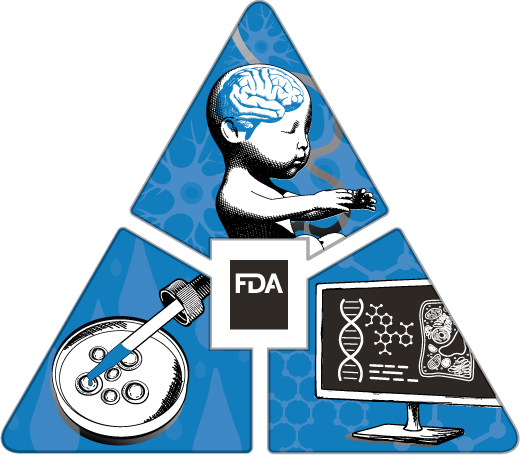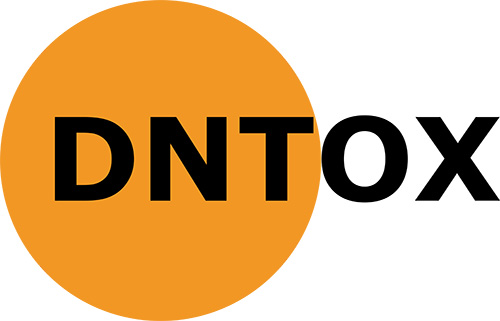
|
In-Person Workshop:
|

|







Food and Drug Administration
Harvey W. Wiley Federal Building Auditorium
5001 Campus Drive
College Park, Maryland 20740 USA
ID Requirements
A valid government-issued photo identification (i.e., driver’s license, passport) will be required
to enter the Harvey W. Wiley Federal Building.
Dates: November 14-15, 2023
Time: 8:30 AM - 5:00 PM
Fee: None
Event Background
Human neurodevelopment involves highly complex biological processes that are essential for normal function. These processes may be susceptible to the effects of exposure to chemicals, including environmental contaminants, dietary components, and consumer products, that may adversely impact key neurodevelopmental processes which has the potential to result in permanent neurological dysfunction. Compared to the adult brain, the developing human brain is inherently more vulnerable to the effects of a variety of potentially toxic compounds. The rise in reported neurodevelopmental impairments in infants and children is suspected to be caused, in part, by exposure to certain compounds during the pre- and postnatal periods. To address the challenges associated with traditional in vivo DNT testing guidelines, there has been increased focus on developing new approach methods (NAMs) and other concepts [e.g., adverse outcome pathways (AOPs)] based on non-animal testing to assess the potential DNT effects of compounds on humans more efficiently. CFSAN seeks to bring together experts in DNT to discuss the current state of the science on the development and use of alternative approaches to animal testing (e.g., in silico, in chemico, in vitro, and non-mammalian whole organisms) and considerations to optimize their application in regulatory decision-making. This two-day in-person workshop will include speakers from governmental agencies, industry, and academia and moderated panel discussions to foster the exchange of ideas and perspectives on the most current advances, knowledge gaps, challenges, and anticipated future work in the development of alternative approaches for DNT, including increasing confidence in and acceptance of their incorporation into regulatory frameworks.
Event Speakers

Kelly Carstens, PhD
Biologist
Environmental Protection Agency
Computational Toxicology and Bioinformatics Branch
Biomolecular and Computational Toxicology Division
Center for Computational Toxicology and Exposure
Presentation: Computational Approaches for Evaluating DNT NAMs
Dr. Carstens is a Principal investigator in the Center for Computational Toxicology and Exposure
in the Office of Research and Development at the US EPA. Focused on using computational
approaches and predictive modeling to evaluate chemical toxicity potential on human health and
the environment, with expertise in the field of developmental neurotoxicity.

Marc Ferrer, Ph.D
Director
3D Tissue Bioprinting Laboratory
National Center for Advancing Translational Sciences (NCATS)
National Institute of Health
Presentation: Biofabricated Functional Brain Region-Specific Neural Organotypic Models for Compound Screening
Dr. Ferrer is the Director of the NCATS 3D Tissue Bioprinting Laboratory, a multidisciplinary
group with the goal of creating, validating, and using 3D bioengineered tissues for disease
modeling and drug discovery and development. Previously, Marc was a Team Lead at the NIH
Chemical Genomics Center working on the discovery of small molecule probes to study protein
function. Before joining NIH, he was Director of Assay Development and High Throughput
Screening at the Department of Automated Biotechnology at the Merck Research Laboratories.
Marc received a BSc degree in Organic Chemistry from the University of Barcelona, and a Ph.D.
degree in Biological Chemistry from the University of Minnesota.

Ellen Fritsche, MD
Professor
Heinrich-Heine University
Düsseldorf, Germany
Dr. Fritsche is a full University Professor at the Heinrich-Heine-University in Düsseldorf, Germany and
working group leader of the group ‘Alternative method development for environmental toxicity
testing’ at the IUF – Leibniz Research Institute for Environmental Medicine. She is a medical doctor
by training and habilitated in environmental toxicology. She has more than 20 years of experience in
toxicological sciences including mechanistic studies and more than 15 years of experience in the
development of new approach methods in vitro. She coordinated the EFSA-DNT project for
application of a developmental neurotoxicity (DNT) in vitro battery for regulatory purposes. She
participates in the European projects, ENDpoiNTs, ONTOX and PARC. She is a member of the German
MAK commission (Health Hazards of Chemical Compounds in the Work Area), the DNT in vitro OECD
Expert Group and the scientific advisory group for the OECD DNT guidance document. She authored
more than 90 publications in international peer-reviewed journals (h-index in Research Gate: 43),
scientific opinions and book chapters. She is editor-in-chief of the journal Frontiers in
Neurotoxicology. Recently, she founded the start-up company DNTOX – providing in vitro assay
services for safety assessment.

Yijie Geng, PhD
Assistant Professor
University of Washington School of Public Health
Department of Environmental and Occupational Health Sciences
Presentation: Scaling Up Sociality: High-Throughput and Computational Assessment of Social Behavior in Zebrafish
Dr. Geng is an Assistant Professor in the Department of Environmental & Occupational Health
Sciences at the University of Washington School of Public Health. He received his BS in
biological sciences and bioengineering from Tsinghua University and his PhD in cell and
developmental biology from University of Illinois at Urbana-Champaign. He completed his post-
doctoral research at Harvard and University of Utah, focusing on using chemical biology and
machine learning to study environmental impacts on social behavior. Dr. Geng is broadly
interested in elucidating the molecular basis of social behavior in health and diseases. In
particular, a current focus of the Geng lab is to understand how environmental factors influence
social behavior and its related mental illnesses such as autism spectrum disorder. His work
integrates model organisms (zebrafish and rodents), chemical biology (high-throughput chemical
screening) and toxicology, machine learning, genetics, neuroscience, and translational medicine,
with the goal of introducing a new research paradigm into the field of environmental toxicology
for mental illnesses.

Thomas Hartung, MD, PhD
Professor and Chair
John Hopkins University
Center of Alternatives to Animal Testing
Presentation: Two Decades Learning on the Road to Non-Animal DNT
Dr. Hartung is the Doerenkamp-Zbinden-Chair for Evidence-based Toxicology in the
Department of Environmental Health and Engineering at Johns Hopkins Bloomberg School of
Public Health and the Whiting School of Engineering, Baltimore. He also holds a joint
appointment for Molecular Microbiology and Immunology at the Bloomberg School. He is
adjunct affiliate professor at Georgetown University, Washington D.C.. In addition, he holds a
joint appointment as Professor for Pharmacology and Toxicology at University of Konstanz,
Germany; he also is Director of Centers for Alternatives to Animal Testing
(CAAT) of both universities. CAAT hosts the secretariat of the Evidence-Based Toxicology Collaboration and manages collaborative programs on
Good Read-Across Practice, Good Cell Culture Practice, Green Toxicology, Developmental
Neurotoxicity, Developmental Immunotoxicity, Microphysiological Systems and Refinement. As
PI, he heads the series of annual Microphysiological Systems World Summits started in 2022
with 60+ organizations. He is Field Chief Editor of Frontiers in Artificial Intelligence. He is the
former Head of the European Commission’s Center for the Validation of Alternative Methods
(ECVAM), Ispra, Italy, and has authored more than 660 scientific publications with more than
44,000 citations (h-index 111). His toxicology classes on COURSERA had almost 18,000 active
learners.

Helena Hogberg, PhD
Presentation: An Integrated Testing Strategy to Screen Chemicals for Developmental Neurotoxicity
Dr. Hogberg joined the NTP Interagency Center for the Evaluation of Alternative Toxicological
Methods (NICEATM) within the Division of the NTP, National Institute of Environmental
Health Sciences (NIEHS) in Dec 2021, where she is conducting research drawing on her broad
expertise in applying in vitro methods to assessing developmental neurotoxicity (DNT) potential
of chemicals.
Previously she was the Deputy Director of the Center for Alternatives to Animal Testing (CAAT)
within the Johns Hopkins University Bloomberg School for Public Health. She received her
Ph.D. her in toxicology from Stockholm University but performed her research at the European
Centre for the Validation of Alternative Methods (ECVAM) in Ispra, Italy.

Iris Mangas, PhD
Regulatory Toxicologist
European Food Safety Authority (EFSA)
Presentation: Single Chemical Risk Assessment Integrated Approaches to Testing and Assessment (IATA) Case Studies Using NAMs for DNT
Dr. Mangas is a Regulatory Toxicologist with 15 years of experience. She holds a Ph D in molecular
neurotoxicology. Since 2018, she is a Scientific Officer at in the Pesticides Peer Review Unit of the
European Food Safety Authority. She is in charge of the Peer Review of Pesticides Human Health Risk
Assessment in EU. She coordinates several EFSA developmental activities for improving EFSA Risk
assessment methods in the area of developmental neurotoxicity and Endocrine Disruptor properties,
including development of New Approach Methodologies, IATA case studies and AOPs.

Sue Marty, PhD
The Dow Chemical Company
Toxicology Science Leader and Senior TERC Fellow
Toxicology and Environmental Research and Consulting (TERC)
Presentation: An Integrated Testing Strategy to Screen Chemicals for Developmental Neurotoxicity
Dr. Marty received her PhD in reproductive toxicology from the University of
Michigan and conducted postdoctoral work in neurotoxicology at Michigan State
University. Currently, Dr. Marty is a Senior Fellow and Toxicology Science Leader at Dow,
Inc. In her current role, she develops research strategies to evaluate and apply new
approach methods (NAMs) for Dow’s Predictive Toxicology Program. In addition, she
works with Dow R&D to deploy early screening approaches for more sustainable
chemistries. She has served on numerous government-supported committees and
currently serves on the OECD Developmental Neurotoxicity Expert Group and as an ad
hoc member of the Scientific Advisory Committee on Alternative Toxicological Methods
(SACATM).

Monique Perron, PhD
Senior Science Advisor
US Environmental Protection Agency
Office of Pesticide Programs
Presentation: Regulatory Application of the DNT NAMs for Chemical Risk Assessment (Part 2)
Dr. Monique Perron has over 20 years of experience in toxicology and risk assessment. She
currently serves as the Senior Science Advisor for the US EPA’s Office of Pesticide Programs
(OPP), where she has reviewed and evaluated toxicological studies, conducted human health risk
assessments as part of multidisciplinary teams, and worked on an array of projects to help
integrate best available science into regulatory decisions. In recent years, many of these projects
have focused on efforts to reduce OPP’s reliance on animal testing through the development and
application of new approach methodologies and incorporation of human relevant information
into pesticide assessments. Prior to joining the US EPA, Dr. Perron obtained her graduate degrees
from Harvard School of Public Health and held post-doctoral positions with Brown University
and the National Research Council, where she collaborated with US EPA on research projects
aimed at identifying and assessing the toxicity of a wide range of environmental contaminants.

Joëlle Rüegg, PhD
Professor and Chair
Uppsala University
Presentation: Novel Molecular Initiating and Key Events by Linking DNT to Endocrine Disruption and Epigenetic Changes
Dr. Joëlle Rüegg is professor and chair of physiology and environmental toxicology as well as head of the department of organismal biology at Uppsala University. She conducted her PhD at the Max Planck Institute of Psychiatry and the Ludwig Maximilian University Munich, Germany, and obtained a PhD in biochemistry “summa cum laude” in 2004. After self-funded postdoc positions at Karolinska Institute in Sweden (2005-2009) and researcher positions at the University of Basel, Switzerland (2010-2013), and Karolinska Institute (2013-2019), she became professor of environmental toxicology at Uppsala University in 2019. Her research focuses on deciphering molecular mechanisms underlying neurodevelopmental effects of endocrine disruptors and chemical mixtures, with particular focus on epigenomics and multigenerational effects. Dr. Rüegg’s research is embedded into larger national and international interdisciplinary projects, including the Horizon 2020 research and innovation action ENDpoiNTs, which she is coordinator for. The aim of ENDpoiNTs is to develop novel test methods addressing endocrine disruption-induced developmental neurotoxicity.

Dr. Magda Sachana
Policy Analyst
Environment Health and Safety Division
Environment Directorate
Organisation for Economic Co-operation and Development (OECD)
Presentation: The OECD Adverse Outcome Pathways (AOP) Program Supports Integrated
Approaches to Testing and Assessment (IATA) and Biomarkers Development for DNT Through
Contextualization of Mechanistic Information
Dr. Sachana has been an Administrator within the Environment Health and Safety Division of the
OECD’s Environmental Directorate since 2015. She manages the development and implementation
of policies in the field of chemical safety and contributes to the OECD Test Guidelines, Pesticides and
Hazard Assessment Programmes. Dr Sachana, among other projects, has been managing the OECD
project on the in vitro battery for developmental neurotoxicity since 2017.

Maren Schenke, PhD
Postdoctoral Fellow
Center for Alternatives to Animal Testing
Johns Hopkins University
Johns Hopkins Bloomberg School of Public Health
Presentation: Sex Differences and Other Missing Factors for in vitro DNT
Dr. Schenke is a postdoctoral fellow at the Center for Alternatives to Animal Testing at Johns Hopkins
University with a background in biochemistry and in vitro toxicology. She received her PhD from the
University of Veterinary Medicine, in Hannover, Germany.
Her research interest lies in the development of neuronal models derived from human stem cells, with
the goal to advance human-relevant methodologies resulting in more meaningful biomedical research.
Her current research seeks to improve human in vitro neuronal models to account for biological sex, as
neurodevelopment and neurotoxicology are quite sex-specific, which is rarely taken into account.

Tim Shafer, PhD
Environmental Protection Agency
Rapid Assay Development Branch
Biomolecular and Computational Toxicology Division
Center for Computational Toxicology and Exposure
Presentation: Progress in Linking DNT In Vitro Battery Endpoints to Adverse Outcome Pathways
Dr Tim Shafer is a Research Toxicologist and Principal Investigator in the Biomolecular and
Computational Toxicology Division in the Center for Computational Toxicology and Exposure
in the Office of Research and Development at the U.S. Environmental Protection Agency. Tim
earned his PhD from the Department of Pharmacology and Toxicology at Michigan State
University.
For the past 15 years, Tim’s work has been directed towards development of new alternative
methods for assessment of neurotoxicity and developmental neurotoxicity hazards of chemicals.
He has published over 100 peer-reviewed journal articles, book chapters and reports; has
received 8 Scientific and Technological Achievements Awards and Bronze and Gold medals for
outstanding service to the Agency.
Dr Shafer has also served ORD as an Acting Branch Chief, Acting Assistant Laboratory Director
for Human Health Research, Acting Director of the Integrated Systems Toxicology Division. In
addition, he has held appointments and elected offices outside of EPA including serving on grant
review panels (ALTOX3/NAL study section at NIH), Society of Toxicology Program Committee
and Secretary/Treasurer of the Society of Toxicology’s Neurotoxicology Specialty Section,
President of the International Neurotoxicology Association and appointments as Associate Editor
for the journal NeuroToxicology and to the Editorial Board of Toxicology and Applied
Pharmacology.

Lena Smirnova, PhD
Assistant Professor
Center for Alternatives to Animal Testing (CAAT)
Johns Hopkins University Bloomberg School of Public Health
Presentation: Advanced 3D Brain Microphysiological System for Complex DNT Endpoints
Dr. Smirnova is an assistant professor at the Environmental Health and Engineering Department
at Bloomberg School of Public Health and Center of Alternatives to Animal Testing, Johns
Hopkins University, where she is leading Education Program and Program on
microphysiological systems. She has joint appointments at Johns Hopkins School of Engineering
and Georgetown University. Her research focuses on the development of new approach
methodologies for developmental neurotoxicity testing and understanding gene environmental
interactions in autism. She promotes the idea of organoid intelligence as a new field to address
cognition with an in vitro brain model – a brain microphysiological system. She is a Co-organizer of a series of conferences on Microphysiological Systems (MPS) and is a president of
the International MPS Society.

John Talpos, Ph.D.
Director, Division of Neurotoxicology
National Center for Toxicological Research
Food and Drug Administration
Presentation: Leveraging NAMs to Enhance Developmental Neurotoxicity Assessments
Dr. Talpos is a graduate of Kalamazoo College (B.A.) and the University of Cambridge (M.Phil, Ph.D.). Dr.
Talpos completed his post-doctoral training in behavioral pharmacology at Eli Lilly (U.K.) prior to joining
Janssen Pharmacutica in Belgium. While at Janssen Pharmacutica Dr. Talpos established a translational
cognition lab to screen potential procognitive compounds for treatment of schizophrenia, Alzheimer’s
disease, and autism spectrum disorder. Dr. Talpos’ team screened hundreds of compounds and
supported numerous drug development programs. During this time Dr. Talpos collaborated widely, most
notably on several IMI projects and the CNTRICS initiative. In 2016 Dr. Talpos joined the FDA’s National
Center for Toxicological Research (NCTR) as head of the Advanced Cognition laboratory, and in 2018 Dr.
Talpos became head of the NCTR’s nonhuman primate program. Throughout his tenure at the FDA Dr.
Talpos’ research has focused on understanding the neurodevelopmental impact of early life exposure to
anesthesia and analgesia. In 2021 Dr. Talpos was selected as the Director of the NCTR’s Division of
Neurotoxicology. Dr. Talpos leads a 30-person team dedicated to neurotoxicity research. The division
uses methods ranging from microphysiological systems to large animal MRI, with a special emphasis on
in vivo developmental toxicity assessments.

Robyn Leigh Tanguay, PhD
Oregon State University
University Distinguished Professor
College of Agriculture Sciences
Environmental and Molecular Toxicology
Tanguay Laboratory
Presentation: Scientific Rationale and Opportunities to Use Integrated Models for DNT Assessments
Dr. Tanguay is a University Distinguished Professor in the
Department of Environmental and Molecular Toxicology and
the Director of the Superfund Research Center and the
Sinnhuber Aquatic Research Laboratory Oregon State
University. She received her BA in Biology from Cal State
University-San Bernardino, her PhD in Biochemistry from
the University of California-Riverside and postdoctoral
training from the University of Wisconsin – Madison. Dr. Tanguay
has pioneered and championed the use of zebrafish as a
systems and transational toxicology model.

Andrea Terron, DVM, PhD
Senior Scientific Officer
Toxicologist
European Food Safety Authority (EFSA)
Presentation: The EU Regulatory Landscape and the EFSA Prospective Plan for the Regulatory Implementation of the DNT-IVB
Dr. Terron is currently serving at the European Food Safety Authority since 2013 as a senior
Scientific Officer, Toxicologist, in the Mammalian Tox Team of the Pesticide Peer Review Unit.
Andrea has a degree in Veterinary Medicine and diplomate at the Royal College of Pathologist in
Toxicology Pathology and is currently fellow of the Royal College of Pathologists and chair of
examiners in Toxicology Pathology at the College. In EFSA, Dr. Terron is mainly involved in the
regulatory Risk Assessment of Pesticides and is managing NAMs based projects on DNT and
NT as well as is involved in several Institutional activities on NAMs. Before EFSA, Dr. Terron
gained experience in drug development as Toxicologist/Pathologist since 1986.


